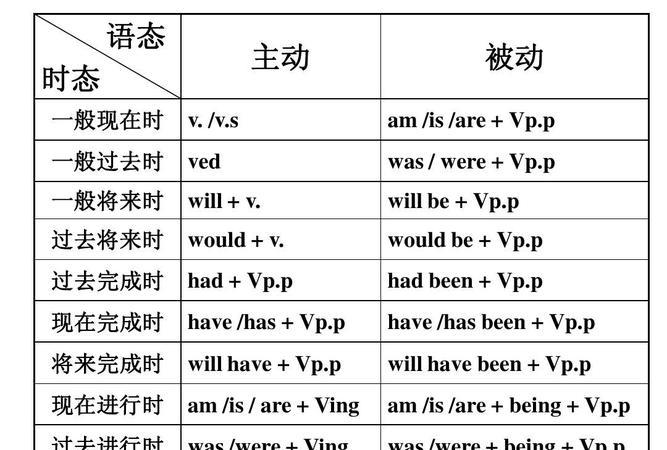英语中的被动语态用于表达动作的承受者,包括现在时、过去时、现在完成时、过去完成时、将来时和将来完成时。例如,现在时的被动语态结构为"am/is/are + 过去分词",过去时的结构为"was/were + 过去分词",现在完成时的结构为"has/have been + 过去分词",过去完成时的结构为"had been + 过去分词",将来时的结构为"will be + 过去分词",将来完成时的结构为"will have been + 过去分词"。

现在时被动语态
现在时被动语态的结构为:am/is/are + 过去分词。例如:
- The book is being read by me. (这本书正在被我阅读。)
- The report is being written by him. (这份报告正在被他撰写。)
过去时被动语态
过去时被动语态的结构为:was/were + 过去分词。例如:
- The cake was made by her. (这个蛋糕是她做的。)
- The letter was written by him. (这封信是他写的。)
现在完成时被动语态
现在完成时被动语态的结构为:has/have been + 过去分词。例如:
- The movie has been watched by us. (这部电影已经被我们看过。)
- The work has been completed by them. (这项工作已经被他们完成。)
过去完成时被动语态
过去完成时被动语态的结构为:had been + 过去分词。例如:
- The money had been spent by him. (这笔钱已经被他花掉了。)
- The book had been read by me. (这本书已经被我读过了。)
将来时被动语态
将来时被动语态的结构为:will be + 过去分词。例如:
- The house will be built by them. (这栋房子将会被他们建造。)
- The package will be delivered by the courier. (这个包裹将会被快递员送达。)
将来完成时被动语态
将来完成时被动语态的结构为:will have been + 过去分词。例如:
- The project will have been completed by next month. (这个项目到下个月将会被完成。)
- The meal will have been cooked by the time we arrive. (我们到达时这顿饭将会被烹饪完毕。)
